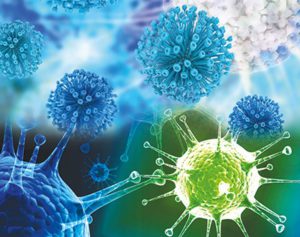MICROBIOLOGY
- INTRODUCTION
- COURSE
- CAREER OPPORTUNITIES
- COLLEGES IN INDIA
- SPECIALISATION
- SKILL SET
- ROLES AND RESPONSIBILITIES

Microbiology is the study of microscopic organisms, such as bacteria, viruses, arches, fungi and protozoa. This discipline includes fundamental research on the biochemistry, physiology, cell biology, ecology, evolution and clinical aspects of microorganisms, including the host response to these agents.
It encompasses fields including medicine, clinical research, agriculture, nanotechnology, chemical technology, diary, etc. Microorganisms are present everywhere, and the fact that they influence the environment in a multitude of ways makes the research domain fascinating and enthralling. Some contributions of Microbiology to the world can be grouped under the name of dairy products, medicines, vaccines, enzymes and vitamins.
- Bachelor of Science in Microbiology or B.Sc. (Microbiology)
- Bachelor of Science in Applied Microbiology or B.Sc. (Applied Microbiology)
- Bachelor of Science in Industrial Microbiology or B.Sc. (Industrial Microbiology)
- Bachelor of Science in Clinical Microbiology or B.Sc. (Clinical Microbiology)
- Master of Science in Microbiology or M.Sc. (Microbiology)
- Master of Science in Applied Microbiology or M.Sc. (Applied Microbiology)
- Master of Science in Medical Microbiology or M.Sc. (Medical Microbiology)
- Master of Science in Microbial Genetics and Bioinformatics
- Laboratories
- Private Hospitals
- Research Organizations
- Universities
- Pharmaceutical Industries
- Food Industry
- Beverage Industry
- Chemical Industries
- Environmental Agencies
- Agriculture Departments
- Panjab University- Chandigarh.
- University of Delhi-Delhi
- Ethiraj College for Women -Chennai
- Mumbai University- Mumbai
- Madras Christian College- Chennai
- Fergusson College-Pune
Punjab Agricultural University, Ludhiana
- Course: Integrated M.Sc. Microbiology (Hons.)
- Eligibility: 10+2 or equivalent with Physics, Chemistry and Mathematics/Biology/ Agriculture with at least 50% marks in aggregate.
- Selection process: CET
Punjab University- Chandigarh
- Course: Sc. (Honours) in Microbiology.
- Duration: 3 Years
- Eligibility: Min 50% marks in 10+2 with Biology, Physics and Chemistry
University of Delhi-Delhi
- Course:Sc. (Honours) in Microbiology.
- Duration:3 Years.
- Eligibility: 10+2 with min 55% or more in the aggregate of 3 subjects Physics, Chemistry and Biology/Bio-tech
- Selection Mode: On the basis of marks in Physics, Chemistry and Biology/Bio-tech
DU Colleges offering the Course
- Gargi College (W)
- Ram Lal Anand College
- Swami Shardhanand College
- Institute of Home Economics (W)
- Bhaskaracharya College of Applied Sciences
- Shaheed Rajguru College of Applied Sciences for Women (W)
Ethiraj College for Women -Chennai
- Course: Sc. Microbiology
- Duration:3 Years
- Eligibility: 10+2 with Biology or Botany/Zoology or Botany as subjects.
Mumbai University- Mumbai
- Course: Sc. in Microbiology (3 subject combination)
- Eligibility: 10+2 with Biology or Botany/Zoology or Botany as subjects
- Admission Mode: Marks Based
Madras Christian College- Chennai
- Course:Sc. Microbiology
- Eligibility: 10+2 with Biology/Botany and Zoology as subjects
- Selection Mode:Marks basis.
Fergusson College, Pune.
- Course: B.Sc. Microbiology.
- Eligibility: 10+2 with Biology as subject.
- Selection process: Marks basis.
- Bacteriology: the study of bacteria.
- Mycology: the study of fungi.
- Protozoology: the study of protozoa.
- Phycology/ algology: the study of algae.
- Parasitology: the study of parasites.
- Immunology: the study of the immune system.
- Virology: the study of viruses.
- Analytical Skills.
- Interest in research.
- Observant attitude.
- Ability to work in a team of professionals.
- Good communication skills.
Typical work activities vary depending on the area of specialisation. For instance, healthcare scientists working in microbiology are more involved in preventing, diagnosing and controlling the spread of infections, whereas those working in manufacturing are involved in quality checks, finding signs of contamination.
However, typical activities may include
- Employing a variety of identification methods such as molecular techniques to test samples
- Tracking of microbes in a variety of environments
- Developing and planning methods to prevent the spread of diseases
- Developing and registering new diagnostic tests, medicines, vaccines, enzymes, vitamins, hormones, antimicrobials and pharmaceutical products
- Scheduling, implementing and evaluating new products in clinical trials
- Growing microbial cultures for use in the food and drink industry or in agriculture







